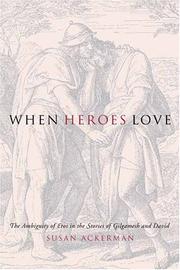Check nearby libraries
Buy this book

Toward the end of the Mesopotamian Epic of Gilgamesh King Gilgamesh laments the untimely death of his comrade Enkidu, "my friend whom I loved dearly." Similarly in the Bible, David mourns his companion, Jonathan, whose "love to me was wonderful, greater than the love of women." These passages, along with other ambiguous erotic and sexual language found in the Gilgamesh epic and the biblical David story, have become the object of numerous and competing scholarly inquiries into the sexual nature of the heroes' relationships. Susan Ackerman's innovative work carefully examines the stories' sexual and homoerotic language and suggests that its ambiguity provides new ways of understanding ideas of gender and sexuality in the ancient Near East and its literature.
In exploring the stories of Gilgamesh and Enkidu and David and Jonathan, Ackerman cautions against applying modern conceptions of homosexuality to these relationships. Drawing on historical and literary criticism, Ackerman's close readings analyze the stories of David and Gilgamesh in light of contemporary definitions of sexual relationships and gender roles. She argues that these male relationships cannot be taken as same-sex partnerships in the modern sense, but reflect the ancient understanding of gender roles, whether in same- or opposite-sex relationships, as defined as either active (male) or passive (female). Her interpretation also considers the heroes' erotic and sexual interactions with members of the opposite sex.
Ackerman shows that the texts' language and erotic imagery suggest more than just an intense male bonding. She argues that, though ambiguous, the erotic imagery and language have a critical function in the texts and serve the political, religious, and aesthetic aims of the narrators. More precisely, the erotic language in the story of David seeks to feminize Jonathan and thus invalidate his claim to Israel's throne in favor of David. In the case of Gilgamesh and Enkidu, whose egalitarian relationship is paradoxically described using the hierarchically dependent language of sexual relationships, the ambiguous erotic language reinforces their status as liminal figures and heroes in the epic tradition.
Check nearby libraries
Buy this book

Previews available in: English
Subjects
David, king of israel, Jonathan (biblical figure), Gilgamesh, Bible, criticism, interpretation, etc., o. t. historical books, Homosexuality in literature, Homosexuality in the Bible, Criticism, interpretation, Bible, LGBTQ religion & spirituality, LGBTQ history, Lambda Literary Awards, Lambda Literary Award Winner| Edition | Availability |
|---|---|
|
1
When Heroes Love: The Ambiguity Of Eros In The Stories Of Gilgamesh And David (Gender, Theory, and Religion)
May 2005, Columbia University Press
Paperback
in English
0231132611 9780231132619
|
zzzz
|
|
2
When heroes love: the ambiguity of eros in the stories of Gilgamesh and David
2005-06-01, Columbia University Press
0231132603 9780231132602
|
zzzz
|
|
3
When Heroes Love: The Ambiguity of Eros in the Stories of Gilgamesh and David (Gender, Theory, and Religion)
April 22, 2005, Columbia University Press
Hardcover
in English
0231132603 9780231132602
|
aaaa
|
|
4
When Heroes Love: The Ambiguity of Eros in the Stories of Gilgamesh and David
2005, Columbia University Press
in English
0231507259 9780231507257
|
zzzz
|
Book Details
The Physical Object
ID Numbers
Community Reviews (0)
Feedback?| July 23, 2021 | Edited by Jenner | Add subjects, description |
| December 8, 2020 | Edited by MARC Bot | import existing book |
| August 1, 2020 | Edited by ImportBot | import existing book |
| April 28, 2010 | Edited by Open Library Bot | Linked existing covers to the work. |
| December 10, 2009 | Created by WorkBot | add works page |











